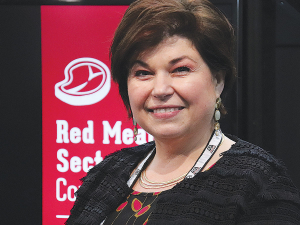Santa's present for the primary sector - an FTA with India
Primary sector leaders have welcomed the announcement of a Free Trade Agreement between India and New Zealand.
 MIA boss Sirma Karapeeva struggles to see how much more automation can be introduced into the meat industry to resolve the present labour shortages.
MIA boss Sirma Karapeeva struggles to see how much more automation can be introduced into the meat industry to resolve the present labour shortages.
Meat Industry Association (MIA) boss Sirma Karapeeva says she struggles to see how much more automation can be introduced into the meat industry to resolve the present labour shortages.
Karapeeva says many people seem to think that automation is the silver bullet that can compensate for labour shortages in the industry caused by the Covid-19 pandemic.
"I struggle to see how that is possible. In the red meat sector, we have already done all that we can do in terms of the lower hanging fruit in automation," she told Rural News.
"The big pieces of automation are already in place and the next areas of automation that could be developed are really challenging because you are dealing with the natural product - meat."
Karapeeva says while it's possible to cut out a widget based on a computer program, it is much more complicated to get a computer to cut a product such as meat. She says there may be an opportunity in the future, but at the moment the industry is having to focus on the immediate labour shortages and can't buy into the idea of further automation.
She also notes that innovation and automation are often confused, but in fact they are quite different things, with innovation often related to streamlining business processes within a company.
The issue that worries Karapeeva the most is that of labour shortages. She says this is the number one issue for the meat industry and she's grateful that the Government has rolled over the current visas for overseas workers for the next two years, which means that the crisis is not so imminent.
"But the idea of rolling over visas is not sustainable and does not give the companies the certainty to plan their production cycles," she adds. "We want to sit down with the Government and find a sustainable, long term solution that will give us certainty and will allow companies to plan."
Karapeeva points out that if the industry is unable to recruit halal slaughterers from overseas, it will devalue the carcass of the animal, impact on company profitability, reduce the value of NZ exports and affect returns to farmers.
Farmer interest continues to grow as a Massey University research project to determine the benefits or otherwise of the self-shedding Wiltshire sheep is underway. The project is five years in and has two more years to go. It was done mainly in the light of low wool prices and the cost of shearing. Peter Burke recently went along to the annual field day held Massey's Riverside farm in the Wairarapa.
Applications are now open for the 2026 NZI Rural Women Business Awards, set to be held at Parliament on 23 July.
Ravensdown has announced a collaboration with Kiwi icon, Footrot Flats in an effort to bring humour, heart, and connection to the forefront of the farming sector.
Forest & Bird's Kiwi Conservation Club is inviting New Zealanders of all ages to embrace the outdoors with its Summer Adventure Challenges.
Grace Su, a recent optometry graduate from the University of Auckland, is moving to Tauranga to start work in a practice where she worked while participating in the university's Rural Health Interprofessional Programme (RHIP).
Two farmers and two farming companies were recently convicted and fined a total of $108,000 for environmental offending.